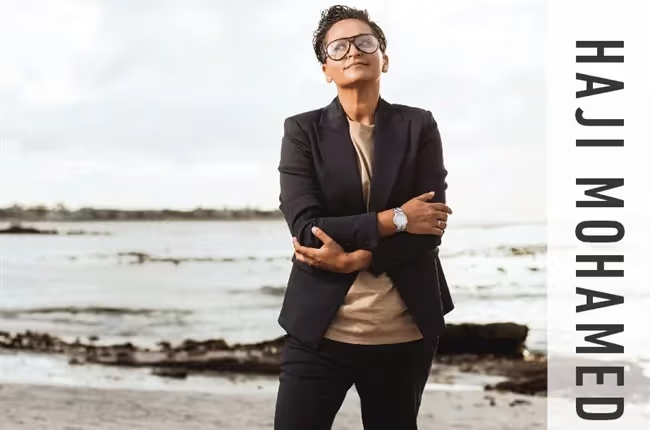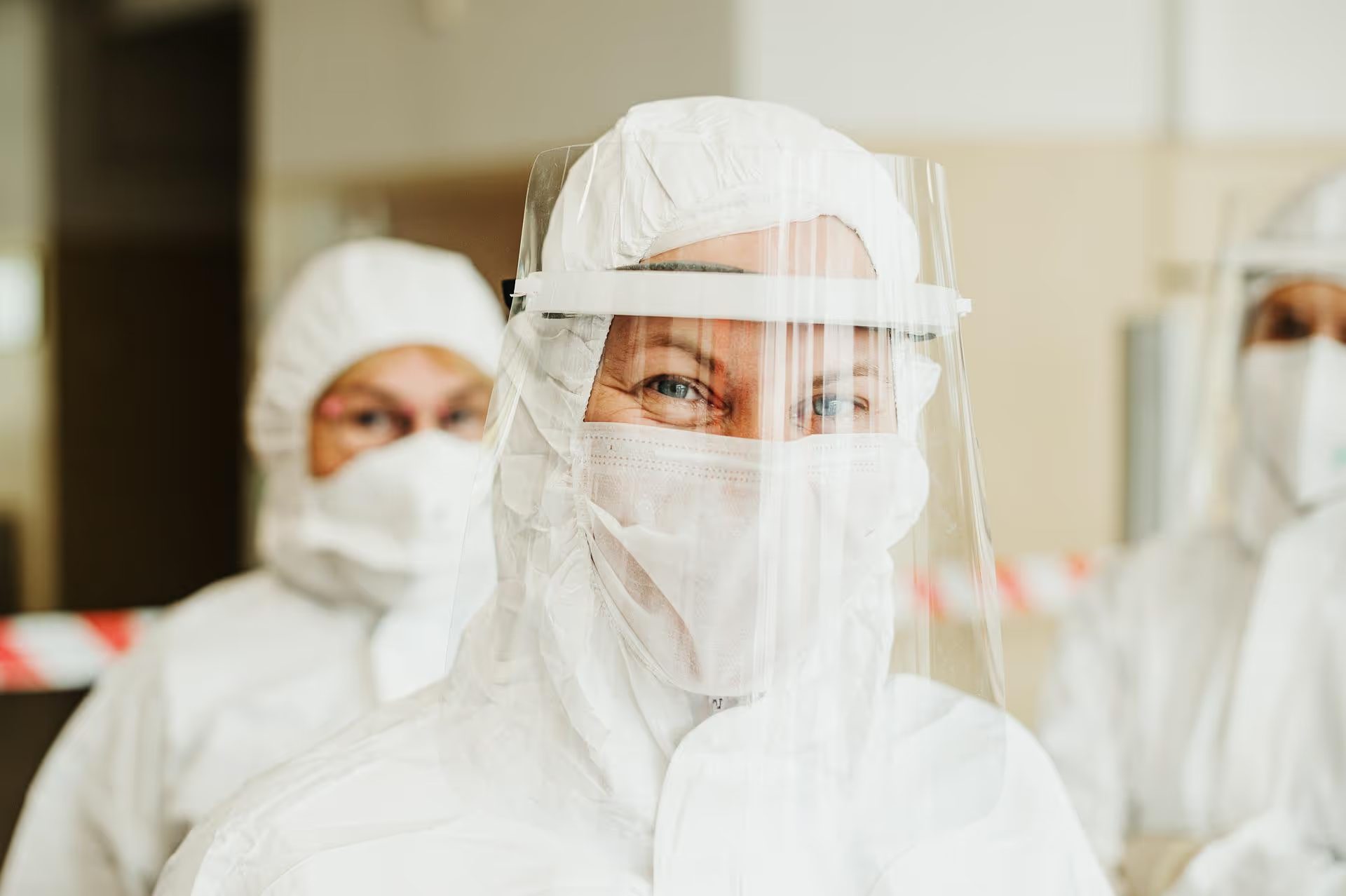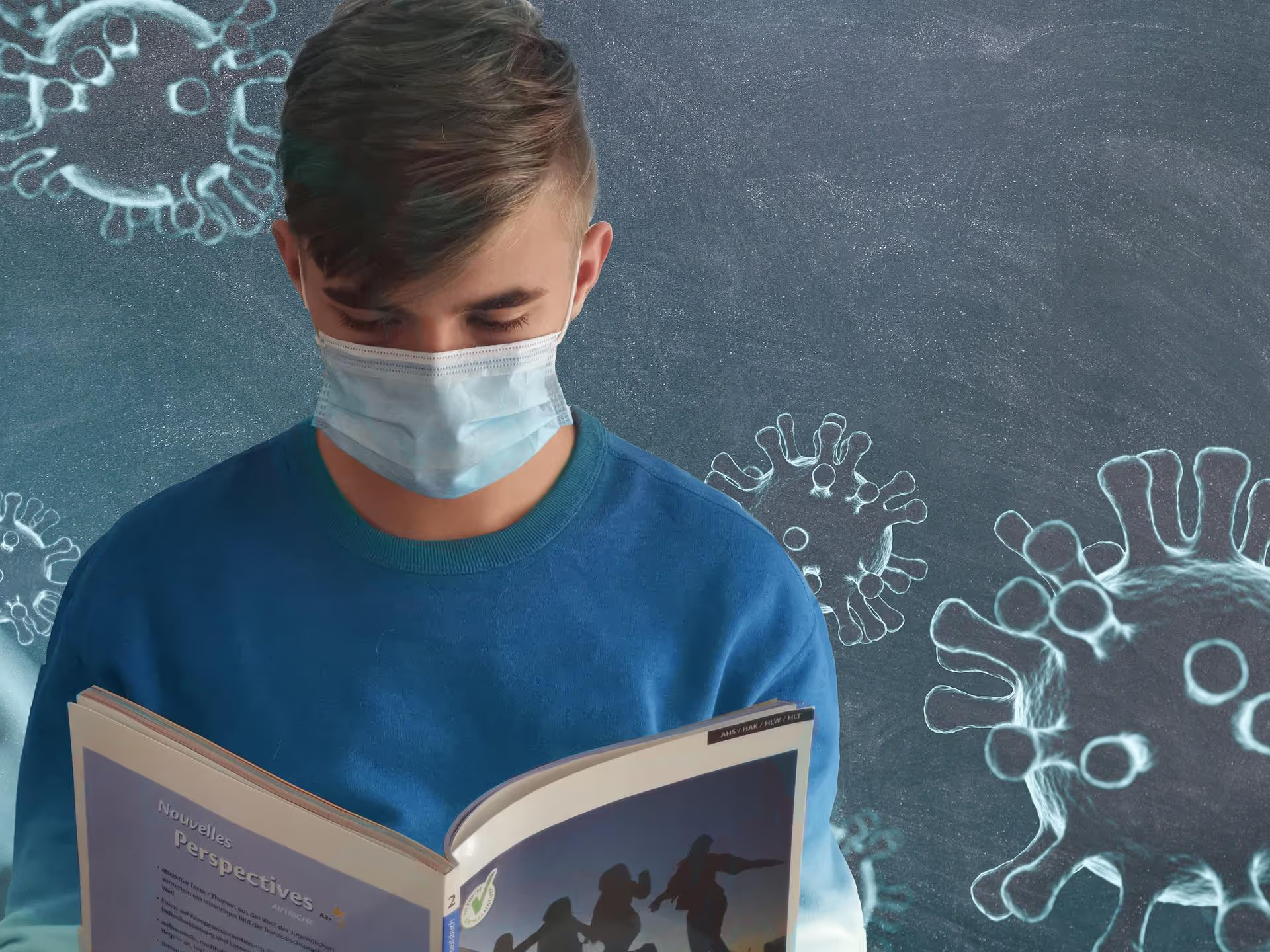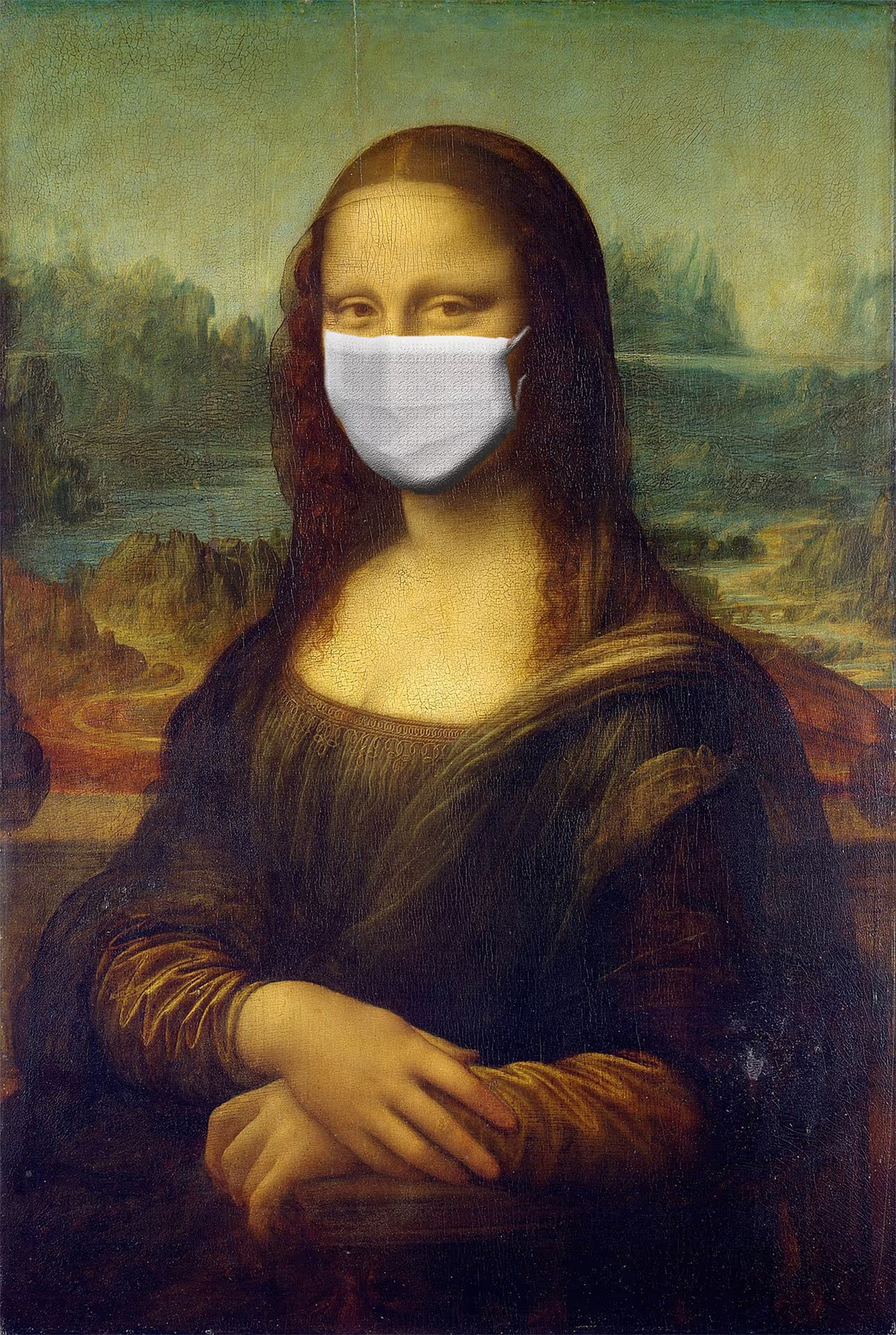.png)
Today, instead of being outside, moving, I am inside, in bed, with a long COVID relapse. And while I have the most wonderful wife, and a lot of care, what I don’t have is answers.
And having an endless ream of questions without anything, or anyone to resolve them, is a very, very lonely and frightening place.
In 2020, nearer the onset of the global pandemic, I was sick with COVID-19 for 23 weeks. It was then that the term long COVID started making its way into the dialogue, especially by those, who like myself, experienced signs and symptoms that lasted more than four weeks and presented with acute infections, in some cases. People with long COVID often present with illnesses that have nothing to do with the symptoms of the virus, as listed by the Center for Disease Control (CDC), or World Health Organization (WHO) at the time. Or alternatively, the infection lasted so long that recognized symptoms such as brain fog or fatigue, for example, persisted and worsened over a longer period of time.
Personally, of all the physical consequences I suffered at that time, the worst, and the ones that have and continue to have the most impact, are neurological and psychological. On good days, I am able to laugh at the fact that I have now, out of nowhere, developed a stutter that kicks in at random, or I am prone to using homonyms instead of the word I am actually supposed to be using – without recognizing that I am doing it to begin with… or just forgetting how to spell. While we’re on forgetting, I must mention that my memory is shot and that I have become less punctual as a result because it takes me forever to remember what I have done with the house keys or the car keys for that matter – most times, they are in my hand but I have a dampened sense of awareness, and on some days, a dampened eyesight to go with it. Blurry vision, sore pupils, blackout headaches, all of which occur without warning or reason.

Why is everything sore and hurting, again? Why does my brain feel like it’s smashing against my skull and why do my bones feel like they’re burning and bruised? Is it because researchers and scientists and the medical industry, so to speak, have discovered that long COVID is potentially a disease that causes a lot of inflammation in the body? Well, in that case, why hasn’t the anti-inflammatory IV helped? And why have I snorted the spice route dry of all the turmeric in the world without result? Why do I have auditory hallucinations? Why can’t I read?
In the past 14 days I have seen two doctors. One gave me a cortisone injection because my body broke out in painful and unexplainable hives, and prescribed schedule 4 anti-histamines. He also had me take a blood thinner for any potential blood clots and gave me a pinprick’s worth of an anti-inflammatory intravenously. I stayed in bed. I didn’t exercise. I didn’t over exert myself. I couldn’t if I wanted to. I was exhausted.
A week later I saw a second doctor, one who had seen me the first time around. She had no answers, no information, no insight and went on to prescribe over the counter medication that I was already taking. That script cost me two weeks worth of groceries. The medication cost less than R100. I am still in bed.
I have not dropped or fetched my son from school since having my relapse. I have not played with him in the active way we usually do. No horse rides on my back, no jumping around and wrestling on the bed. No lifting him over my head to do “bench presses”. Not even mildly exerting games of hide and seek. The most I can do is read copious amounts of books to him, and even then, most of the time, I have to take breaks in-between narrating 10-page long picture books because I gasp for air and break out into fits of coughing or need to stop to take deep breaths to still my head.
My anxiety is off the charts and so is my heart rate. The snake is eating its tail and all I can do is watch.

It’s been nearly two years since the term long COVID started tracking, and along with it, to our relief, researchers, doctors, and scientists have started to study the condition, in most instances, using patient-led methods of data collection. As a result of this hard and insufferable work, there are some answers out there and new findings are discovering potential markers about the disease and for those living with it.
I believe in science. I have faith in scientists. And factual, peer reviewed and well-researched information is the only way to get to the nuts and bolts of this new, dreadful way of life. Only those who have the medical knowledge, resources and understanding of information they uncover can lead us from the darkness and into the light. But in order for that to happen, we need to know what the information means.
I am a middle class, educated individual with a thirst for knowledge. In my experience and as aforementioned, doctors I have visited in know less about the research than I do and therefore are incapable of offering any intervention, even experimentally. The duty of educating myself about my circumstances has fallen on me. But even with all the access to information, and the intelligence I have to filter through it and make sense of it, it is still complicated and confusing

This is not because I am ignorant, or because I just don’t understand or “get” science or because I have no appreciation or understanding for what healthcare professionals and advocates are doing, and how hard they are working to assist. I do not want to be patronized in my quest for understanding what is going on in my own body, I want to understand and if my doctor can’t explain it to me, I am humble enough to turn to the myriad of people out there who may be able to help and who I am fortunate enough to have access to on social media. But here’s the thing, I need to be spoken to, or written to like I am a person. Not like I am stupid, but like I am human being. Because that’s what I am and that’s what scientists are and we are out here shouting for help.
Just yesterday, a new study published in PLOS, (a nonprofit, open access publisher that enables researchers to accelerate progress in science and medicine) revealed that patients living with long COVID have “virus specific T cell levels more than 100 times higher than those who recovered from the disease”. The paper’s senior author, Dr Brent Palmer, associate professor of allergy and clinical immunology at the University of Colorado School of Medicine said that: "The persistence of high numbers of virus-specific T cells in individuals with long COVID suggests that there may be hidden viral reservoirs that are maintaining and leading to long-term symptoms. Current treatments for long COVID, out of necessity, are focused on addressing specific symptoms and not the root cause of the illness. This evidence points toward the reservoirs as a significant factor causing long COVID, which can guide future treatments.”
Palmer also said that the study also looked at two important biomarkers that are used to measure inflammation in the body and the research discovered that the higher the levels of SARS-CoV-2 T cells the higher the measure of inflammation. Conclusively, this means that T cells may play a role in driving chronic inflammation and other long COVID symptoms.
I can dissect this information to the bare bones and Google what T cells are until the cows come home but it’s still not going to make sense to me to the degree that I need it to. What does it mean? For me? For others? Who can interpret this on a very primitive, human level and make it make sense to a person who can’t even remember to set a reminder to remember things in the first place?
In South Africa, we live with the great misfortune of having no public archive of information and research going on – ergo, the government and national health care service providers and other information disseminating parastatals are not assisting the general public, least of all those in need. We’re not privy to the access to care and information that other countries have. Like the UK for example, where there are task forces and NHS long COVID clinics that are equipped to strengthen treatment and rehabilitation for patients. There is no central source of help to offer integrated health services that offer diagnostics, prognosis, treatments, and acute and mental health care. As a result, the health systems, whether private or public are starved of any commissioned guidance or evidence based clinical pathways that guide both their action plans and the treatment plans for patients who require help and services.
Do I wish I could walk into a place that is fully staffed and offers care that includes cognitive, physical, psychiatric and psychological intervention through a face-to-face assessment with health care professionals? Yes. Is this available to me? No. Would these kinds of facilities massively and constructively contribute to the overall education of not only the public but to general medical practices and physicians and provide substantial data through collection and evaluation so that when I go and spend all my monthly budget on a desperate doctors visit I can receive informed advice? 100%. But until then, the only thing that mildly benefits me and hundreds and thousands of other citizens is shooting in the dark on community forums and Twitter threads with very tiny bank balances as a result of needing answers and walking away with none.

Do I wish I could walk into a place that is fully staffed and offers care that includes cognitive, physical, psychiatric and psychological intervention through a face-to-face assessment with health care professionals? Yes. Is this available to me? No. Would these kinds of facilities massively and constructively contribute to the overall education of not only the public but to general medical practices and physicians and provide substantial data through collection and evaluation so that when I go and spend all my monthly budget on a desperate doctors visit I can receive informed advice? 100%. But until then, the only thing that mildly benefits me and hundreds and thousands of other citizens is shooting in the dark on community forums and Twitter threads with very tiny bank balances as a result of needing answers and walking away with none.
Having said that however, there are brilliant minds at work in our country who are assiduously aiming for solutions, remedies and explanatory discoveries. For example, Resia Pretorius at Stellenbosch University is persistent and disciplined in her admirable effort to establish the extent of the long COVID problem in our country and to determine the role blood clotting and circulating inflammatory molecules have on the long term effects of the disease.
The Department of Physiological Sciences professor is documenting symptoms in a South African online registry and recently tweeted: “…We conclude that ME/CFS is accompanied by substantial and measurable changes in coagulability, platelet hyperactivation, and fibrinaloid microclot formation. However, microclot load was not as prevalent as was previously noted in long COVID.” A worthy finding, (if you take the time to unravel the jargon) - but for someone who is on the hunt and hungry for knowledge and insight so as to be able to merely have the will to stay positive and survive, the information is so difficult to process and penetrate.
And while perhaps tweets like these are only meant for academics and scientists and doctors and fellow researchers, Twitter is place many of us turn to for verified information from trustworthy sources who are doing the hard work and who can offer us information because without it, there is simply nowhere else to turn. The silence, so to speak, is more than deafening, it is downright painful and insufferable.
We understand that scientist are busy, and perhaps shouldn’t be bothered, but in the cyclone of misinformation or no information at all, it is the responsibility and onus – to an extent – of educated professionals to perform a civic duty on a platform that plays and should play an important public role, by engaging its audience who are in need of help.
It is not good enough to speak to each other, we are begging, please speak to us in a language we can understand that is not patronising or degrading. We live in a time where social media platforms are the pond-scum of information. Where we cannot trust information to be verified. Where we run the risk of sinking into a deep pothole of fake news and rubbish. But we are also fortunate enough to live in an era where these publicly accessible means of communication can be used for good and democratise information and resources.
As a journalist, a common problem we face in the media industry when trying to dilute information and make it more digestible to the public, is that we often face academics who are simply unwilling to get down to a grassroots level when it comes to conversation and explanation. In instances where said journalist needs the information explained on a personal level, not having the answers when taking the time to seek, is particularly triggering. I can have post-traumatic stress disorder and respect the research and the researcher at the same time.

Uncertainty in scientific process tips the scale onto an unfavorable and rather destructive side because it leans toward a misunderstanding in the research by millions of people who reside outside of scientific communities. Naturally, like any given profession, research and researchers come with a vocation specific language that is used both orally and in the publication of work. This language makes it easy to conform to the understanding of findings when it comes to research and creates a sense of comfort in communities – for the argument of this piece, I refer to academic communities in the sciences, or health rather, in specific. But the impact of the research is not for researchers themselves. The impact of their work is and should be for the greater good of the public and language and terms have different meanings for scientists and general society.
Several studies have shown that there are multitudes of ways for researchers to maintain the certainties or uncertainties in their findings without limiting the impact of the research. Communication in an age that makes it so easy to do so can be used more effectively by research communities for those outside of it who are desperate to make decisions that are informed by scientific evidence.
In fact a paper published way back in 2018 found that accessible social media sites all have and should have the common goal of changing the “perception of medicine from a black box to something more accessible - to allow patients to understand their conditions and make informed decisions.” The study found that the mostly useful platform for that is Twitter. And I quote: The use of Twitter in healthcare has the potential to allow patients to be more informed about their own health, but must balance accessibility with misinformation.
The paper, Social Medicine: Twitter in Healthcare by Yash Pershad, Patrick T Hangge, Hassan Albadwi and Rahmi Oklu; Journal of Clinical Medicine, also highlighted the importance of changing the way audiences receive information. Placing the responsibility on health care professionals to communicate in accessible ways can help “combat misinformation as vigorously as they propagate information".
The reasons and benefits of scientists sharing information on Twitter have long been preached. It is why hashtags such as #LongCovid and #Covid19 s a useful vehicle to compartmentalise online conversations about those topics and keep the conversation condensed, shareable and understandable. Medical researchers jumping on the traction of those hashtags are a useful and necessary tool, and there is a significant amount of uptake by these professionals who are joining online conversations and tagging them for relevance and significance as it pertains to the disease.
The solution is simple, in order for us to find answers to all the questions about long COVID and the impact it has on our lives, (some of which are listed above -that we cannot get by walking into our doctors practices), all that is required is that research is shared by researchers, scientists and whoever else is busy discovering new findings and information to share it in a way that protects sufferers and the public from information that is unavailable, unsound, inaccurate and deeply consequential to our physical and mental well being.
To share research on social media is a choice, to make that choice in the affirmative is to fulfil a civic duty that should not be a need, but a necessity.
Pressure is a privilege. You have the privilege of being in a professional and educated position to provide much needed information. Social media comes with social responsibility. Thank you EWN for the great article.

.png)
Contribute to your future, a Non Profit Organization and buy us a Coffee with 3 simple clicks and a minute of your time. Imagine what we can do together.
To thank you, we will call you personally.
This is the amount that will be distributed amongst the current shareholders.
Current Share Holders
1102/500,000